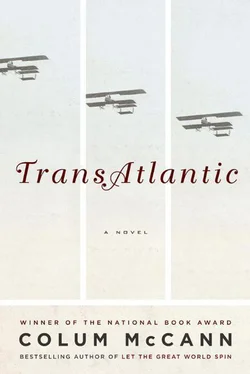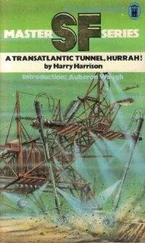They sat for a picnic in the long grass. A cold wind blew in. She could feel it rifling through her.
She could go now, thought Emily. Return to Newfoundland, alone. She would face the days, alone. She would write. Find a small content. A graceful levity.
The lake was tidal. It seemed to stretch forever to the east, rising and falling like a breathing thing. A pair of geese went across the sky, their long necks craned. They soared in over the cottage and away. They looked as if they were pulling the color out of the sky. The movement of clouds shaped out the wind. The waves came in and applauded against the shore. The languid kelp rose and fell with the swells. She could be forgiven the thought that she was already stepping back towards the sea.
HE IS, IN ALL RESPECTS, A PRETTY GOOD SHOT. PLENTY OF power. He can whip a forehand from the back of the court. If he wanted to, he could cover the back line in two or three leaps. But he is more of a loper. His lofty head. His mass of blond curls. An advertisement for ease. His shirt hangs off him, his shorts hang off him, his hangdog features, too. Even his socks have a slouch. Missing their Slazenger. Lord, what she would not give for a gentle cattle prod to wake her grandson for a moment, watch him come to life on the other side of the court. When he returns the ball he does so with a fair amount of accuracy. Can put some sting on a ball when he wants to. Not a bad backhand either. Lottie has seen him slice with artful backspin. A natural talent for the game, but a better one for daydreams. She tried once to engage him in the art of tennis as it related to angles, vectors, trajectories, percentages, any sort of arithmetic she could think of, but he wouldn’t take the bait. Nineteen years old and a fine young mathematician, but he will never storm the outer edges of Wimbledon.
She’s not exactly Billie Jean King herself, but she can still stand and knock the ball back and forth near the net. Especially on a late-summer’s evening with the light still lengthy on the northern sky. Nine in the evening. Sunset still a half hour away.
She can feel the rattle through her bones when she catches one of his returns on the volley. All the way up her fingers, along her wrist, through her elbow, into her shoulder. She is not a fan of these new metal racquets. In the old times they had fishtails, fantails, flattops. Wooden presses. Immaculate workmanship. Now it’s all sleek lines and metal heads. One of these days she’ll return to her old trusty Bancroft. She leans backwards and scoops another ball from the bucket, eases it along the middle line towards Tomas, a smidgen to his left. He watches it bounce blithely past. She should tell him to wake his carcass up, but it is enough that he has come out here with his ancient grandmother in her white knee-length skirt, to knock a ball around. The sight of him alone is easy on the eye. He’s a long handsome drink of water, with Hannah’s sweet face and his long-gone father’s Dutch stare. A little slice of Ambrose in him, too. The curls. A hint of chubby cheek. The bottle-green of the eyes. All the more so because he does not know it: if she told him he was a heartbreaker, he’d be stunned. He’d rather write a theorem for desire. There’s not a young lady around who wouldn’t swoon for him, but he’s more likely to be found in the university library, leafing about, trilling figures through his head. He wants to be an actuary of all things, a creature of predictions and possibilities, but this evening she would simply like to know the chance of him hitting another forehand.
— Get a grip! she shouts. Only six more left. Bring your left foot into it. Easy with your hip.
— All right, Nana.
— Pretend it’s rocket science.
Lottie reaches down for another ball. A slight twinge in her back. A whisper of genetics. A drop of sweat thickens over her lip. She straightens up. She is amazed to see Tomas, at the back of the court, leaning down to pull up his socks, all six foot two of him, beginning to bounce on his toes, the Björn Borg shuffle. She cannot help but chuckle. She rolls the white ball in her fingers, releases it and knocks it gently towards him, the ping off the strings, making sure it has enough of a bounce for him to come in beneath it, and he does, with great gusto. She expects him to miss it altogether, to swing empty, or to balloon it over the fence, but he connects with the ball, and not only that, but he turns his wrist over it, follows through with his shoulder, steps his left foot forward, brings every long inch of himself into the motion, and it whizzes past her at the net, a perfect height, a proper speed, and she turns to see it land, and although both of them know that it bounces inches outside the line, she shouts rather too loud: In!
ON THE DRIVE back to Belfast they are stopped at a checkpoint on the Milltown Road. A half dozen young soldiers, fresh-faced, camouflaged. Always a tingle of fear at the back of her neck. Tomas rolls down his driver’s-side window. They are, they say, checking licenses. Not normally a soldier’s job, but Lottie says nothing. The young soldiers are no older than Tomas himself. A bit scruffy and open-necked. Once upon a time they dressed smartly: shining brass badges and pipe-clayed belts.
One of them leans in the window and glances at her. A whiff of tobacco from him. She is hardly a vision in her wide white skirt and open cardigan, she knows, but she gives him a full smile and says: Anyone for tennis?
The soldier is not too fond of flippancy — no love, no deuce — and he walks the full length of the car, circles it slowly, checks the R sticker on the back, then touches his hand against the bonnet for heat, to see how far they have been driving. Since when might grandmother and grandson be a suspicion? Where might their rocket launchers be hidden? How likely is it that they are off down the Falls or the Shankill for a spot of punishment beating?
Not a word is exchanged and the soldier flicks his head. Tomas puts the car in gear, careful not to make too quick a getaway, towards the house just off the Malone Road.
IT HAS BECOME somewhat shabby over the years, though it has remnants of Victorian beauty. Redbrick. Bow windows. Three stories. Intricate lace on the curtains.
They step down the narrow path, amid the floribundas, the tennis bag over her shoulder. They stop at the cracked steps and he leans down to kiss her cheek.
— Night, Nana, he says, and his lips brush her ear. He has lived these past few months downstairs in the basement flat. Close enough to the university and far enough away from his stepfather. She watches him descend, a little gusto in his step, his blond curls darkening in the shadow.
— Not so fast, hey.
She has taken on many elements of the northern accent, though it is still bedrocked by her Newfoundland days, so there are times that it catches, and the music mixes, and she is not sure which is which anymore. Tomas trundles back up the steps, aware of what is coming. Their Wednesday ritual. She slips the twenty-pound bill into his hand, tells him not to spend it all in one bookshop.
— Thanks, Nana.
Always the quiet boy. Model airplanes. Adventure books. Comics. As a child he was always well-kept in his school uniform: shirt, slacks, polished shoes. Even now, in university, his scruffiness has a slight edge of stiff to it. She would like one day for Tomas to come home in one of those ripped-up T-shirts, with safety pins amok, or a bolt of a ring in his ear, show some proper rebellion, but she knows full well he will probably spend the money wisely, put it towards a telescope or a star map or some other such practicality. He might even put it away for a rainy day, hardly a good idea in this sodden city.
Читать дальше












